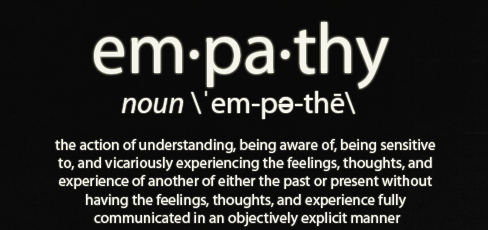How To Show Empathy
How To Show Empathy
What does it mean to have empathy? Melinda Crown gives a great definition:
“Empathy is the art of letting the speaker know you not only understand the words used, but also are sensitive to the feeling that is being expressed.”

“By trying to hear the student and by avoiding the tendency to jump to quickly with advice, solutions, criticisms, reprimands, or interrogations, the teacher keeps the communication lines open. Empathetic, active listening is more than a parroting of the student’s words; it should capture the emotions, intent, and meaning behind them. Sokolove, Garrett, and Sadker have summarized the components of active listening: (1) blocking out external stimuli; (2) attending carefully to both the verbal and nonverbal messages; (3) differentiating between the intellectual and the emotional content of the message; and (4) making inferences regarding the speaker’s feelings. When students realize they really have been heard and not evaluated negatively for what they have said or felt, they begin to trust the teacher and to talk more openly.”
This was a piece relating specifically to a student and teacher; however, if you go through and replace ‘teacher’ with whatever position you hold with Girls In Power, you will see that this piece can relate to anyone. ‘Hearing’ what these girls are saying is not enough, we must truly listen to them! We need to keep the lines of communication open and capture what they are trying to tell us which will lead to trust between the girl and mentor, volunteer, etc.
I have found that one of the easiest ways to show empathy is by using the ‘in their shoes’ process. This is done by listening to someone and then putting yourself in their shoes while they are talking to you. I have found that I am much more likely to show empathy and compassion because I am able to understand exactly how that person feels.
So, the subject is…. How To Show Empathy, right?
One thing that I have found important when using empathy is understanding that you don’t need to always know the answers for one’s problems. Taking the time to listen to what someone is saying and then letting them know that you understand how they are feeling can go a long way! As I have worked with teens throughout my community, I have found that they were more willing to talk to me openly and trust me when I did not ‘evaluate’ their situation, but instead listened, used empathy, and encouraged them.
I want to leave you with a bit of advice that I have given myself when working with teens. ‘Unless they ask you for advice, they typically are not looking for advice, instead, they are looking for someone who will listen and care.’
You can make a difference in a girls’ life simply by listening and caring! Empathy and compassion go a long way.
